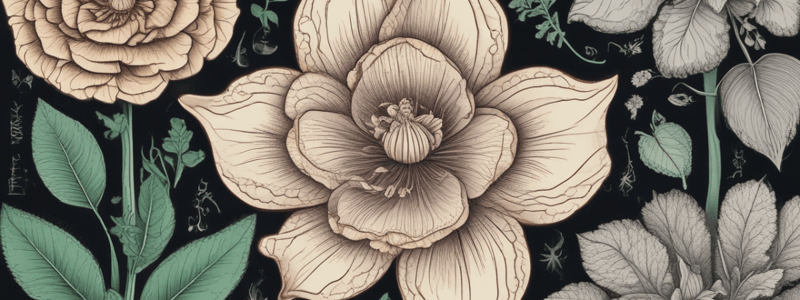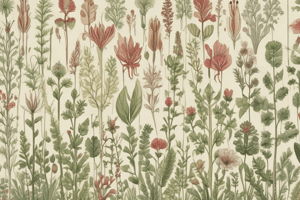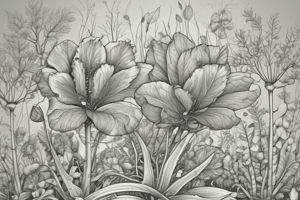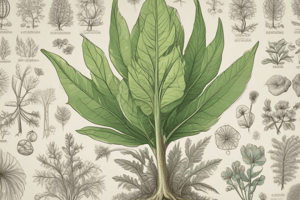Podcast
Questions and Answers
Dermal tissue, or epidermis, is generally a single layer of tightly packed ______ that covers and protects all young parts of the plant.
Dermal tissue, or epidermis, is generally a single layer of tightly packed ______ that covers and protects all young parts of the plant.
cells
Xylem transports water and dissolved minerals ______ from roots into the shoots.
Xylem transports water and dissolved minerals ______ from roots into the shoots.
upward
Phloem transports food from the leaves to the ______ and to non-photosynthetic parts of the shoot system.
Phloem transports food from the leaves to the ______ and to non-photosynthetic parts of the shoot system.
roots
Ground tissue fills the ______ of the plant.
Ground tissue fills the ______ of the plant.
Roots anchor plants and absorb mineral ______ from soil.
Roots anchor plants and absorb mineral ______ from soil.
The root cap covers the ______ of the root.
The root cap covers the ______ of the root.
The vascular cylinder contains ______ and phloem.
The vascular cylinder contains ______ and phloem.
The dermal tissue, or epidermis, is generally a single layer of tightly packed cells that covers and protects all ______ parts of the plant.
The dermal tissue, or epidermis, is generally a single layer of tightly packed cells that covers and protects all ______ parts of the plant.
Vascular tissue ______ continuous throughout the plant.
Vascular tissue ______ continuous throughout the plant.
Xylem transports water and dissolved minerals upward from roots into the ______.
Xylem transports water and dissolved minerals upward from roots into the ______.
Ground tissue fills the ______ of the plant.
Ground tissue fills the ______ of the plant.
Roots anchor plants and absorb mineral nutrients from ______.
Roots anchor plants and absorb mineral nutrients from ______.
The root cap covers the ______ of the root.
The root cap covers the ______ of the root.
The vascular cylinder contains xylem and ______.
The vascular cylinder contains xylem and ______.
Flashcards are hidden until you start studying
Study Notes
Plant Tissue Systems
- Plant organs consist of three tissue systems: dermal, vascular, and ground tissue.
Dermal Tissue
- Also known as the epidermis, it is a single layer of tightly packed cells providing protection to young plant parts.
- Root hairs enhance absorption of water and minerals from the soil.
Vascular Tissue
- Forms a continuous system throughout the plant, facilitating the transport of materials.
- Xylem carries water and dissolved minerals upward from roots to shoots.
- Phloem distributes food from leaves to roots and other non-photosynthetic parts of the plant.
Ground Tissue
- Occupies the interior of the plant and contains three primary cell types: parenchyma, collenchyma, and sclerenchyma.
Roots and Stems
- Roots serve as an anchor for the plant and absorb mineral nutrients from the soil.
- Functionality of roots includes:
- Providing support to the plant structure.
- Absorbing, transporting, and storing nutrients.
- Utilizing root hairs to increase absorption efficiency.
Root Structure
- The root cap protects the root tip.
- The apical meristem is the region of active growth.
- The vascular cylinder houses xylem and phloem for nutrient and water transport.
Plant Tissue Systems
- Plant organs consist of three tissue systems: dermal, vascular, and ground tissue.
Dermal Tissue
- Also known as the epidermis, it is a single layer of tightly packed cells providing protection to young plant parts.
- Root hairs enhance absorption of water and minerals from the soil.
Vascular Tissue
- Forms a continuous system throughout the plant, facilitating the transport of materials.
- Xylem carries water and dissolved minerals upward from roots to shoots.
- Phloem distributes food from leaves to roots and other non-photosynthetic parts of the plant.
Ground Tissue
- Occupies the interior of the plant and contains three primary cell types: parenchyma, collenchyma, and sclerenchyma.
Roots and Stems
- Roots serve as an anchor for the plant and absorb mineral nutrients from the soil.
- Functionality of roots includes:
- Providing support to the plant structure.
- Absorbing, transporting, and storing nutrients.
- Utilizing root hairs to increase absorption efficiency.
Root Structure
- The root cap protects the root tip.
- The apical meristem is the region of active growth.
- The vascular cylinder houses xylem and phloem for nutrient and water transport.
Studying That Suits You
Use AI to generate personalized quizzes and flashcards to suit your learning preferences.




